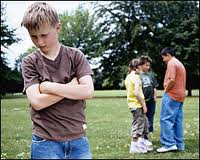Bullying: Los niños con trastornos del espectro autista, sufren traumas emocionales graves (investigación)

El 70% de los niños autistas sufren traumas emocionales como resultado del acoso, según un estudio publicado en Journal of Developmental & Behavioral Pediatrics. Muchos niños autistas temen por su seguridad en la escuela, y los autistas con trastorno por déficit de atención/hiperactividad (TDAH) o depresión corren mayor riesgo de ser acosados.
Los investigadores encuestaron a padres de 1.221 niños con trastornos del espectro autista y hallaron que el 38% de los niños habían sido acosados en un periodo de un mes, y que el 28% eran acosados con frecuencia. Las consecuencias inmediatas del acoso incluían el trauma emocional (69%) y lesiones físicas (8%). El 18% de los niños autistas fueron provocados para defenderse peleando tras ser acosados, y el 40% tuvo un berrinche emocional que conllevó una acción disciplinaria en la escuela. El 9% de los niños autistas acosaban a otros niños, y el 5% acosaban a otros niños con frecuencia. Los niños autistas que también tenían un trastorno de la conducta o un trastorno oposicional desafiante eran más propensos a ser acosadores. Los niños autistas que también sufrían TDAH, trastorno de la conducta o trastorno oposicional desafiante eran más propensos a ser víctimas y acosadores al mismo tiempo.
The Association Between Bullying and the Psychological Functioning of Children with Autism Spectrum Disorders
Zablotsky, Benjamin BA*; Bradshaw, Catherine P. PhD, MEd*; Anderson, Connie PhD†; Law, Paul A. MD, MPH‡
Abstract de la revista Developmental Behavioral Pediatrics
ournals.lww.com/jrnldbp/pages/articleviewer.aspx?year=2013&issue=01000&article=00001&type=abstract
Objective: Bullying has become a major national concern, particularly as it affects children with disabilities. The current study aimed to determine the association between psychiatric comorbid conditions, involvement in bullying (victim, bully, or bully–victim), and the immediate psychological correlates of bullying among children with autism spectrum disorders (ASDs).
Methods: A national sample of 1221 parents completed a survey dedicated to the bullying and school experiences of their child with ASD, reporting on the immediate consequences of bullying involvement, including their child’s psychological well-being and any psychiatric comorbidity. Multivariate logistic regressions were performed to determine whether specific psychiatric comorbidities were associated with an increased risk of involvement as victim, bully, or bully–victim. Analyses of variance determined the relationship between bullying frequency and psychological functioning. All models adjusted for child and school covariates.
Results: Children who were frequently victimized were more likely to present with internalizing symptoms, whereas children who frequently bullied others were more likely to exhibit emotion regulation problems. Children who were identified as frequent bully–victims presented with both internalizing symptoms and emotion regulation problems. Children with attention-deficit hyperactivity disorder (ADHD) and depression were more likely to have been victimized, whereas children with conduct disorder (CD) or oppositional defiant disorder (ODD) were more likely to have bullied other children. Children identified as bully–victims were more likely to have ADHD, CD, or ODD.
Conclusions: Children with ASDs who had displayed bullying behaviors in the past month exhibited psychological impairments, including psychiatric comorbidity. The frequency of bullying behaviors was significantly associated with the level of impairment.
Posts relacionados
- Bullying: reflejo de la violencia que vive la sociedad
- Capacitaciones y Talleres en Bullying, Ciberacoso, Comunicacion No Violenta, Prácticas Restaurativas Juveniles y Mediación Educativa
- Bullying: Impresionante, corto Británico, de lo que es la «Discriminación inversa». Míralo!
- Bullying: Por que el niño hostigado tiene lo que se llama la indefension aprendida
- Bullying: Entro al Parlamento la «Ley Argentina de Acoso Escolar»
- myv
- on May, 15, 2013
- Acoso Escolar, Autoestima, Bullying (Acoso Escolar), Bullying de Verano, Bullying Japon, Bullying Relacional, Bullying y Deporte, BurnOut, Cambio en la Educación, Déficit de Atención, Dra Luciana Cataldi, Educación en Valores, Empatía, I Congreso Internacional de Mobbing y Bullying, II Congreso de mobbing y bullying Argentina, Inteligencia Emocional, Inteligencias Múltiples, Luciana Cataldi, Prevención del Bullying, TDAH, Víctimas de Bullying, Violencia en la Educacion
- No Comments.
Jornadas, Congresos y Charlas
Tweets de MyV
Campaña Nacional Argentina «No al Bullying»
 Ayúdame a difundir y viralizar esta campaña, cuanto mas nos sumemos, mas voces alzaremos contra el bullying.
Ayúdame a difundir y viralizar esta campaña, cuanto mas nos sumemos, mas voces alzaremos contra el bullying. Entradas recientes
- Educación emocional en la escuela: del estándar a la personalización
- Educación emocional:El poder de la palabra en el manejo de las emociones
- Educación: Por que la escuela tradicional esta colapsada? entrevista a Noemi Paymal, antropóloga
- Empatia:Esta es la clave, para que tus hijos triunfen en el futuro
- Inteligencia Emociona:Como enseñar a regular emociones?
Instituto Latino Americano de Prácticas Restaurativas
Visitá el Blog de mi Amigo Andrés
Visita el Blog de 3ra Revolución
Categorías
- Aaron Swartz
- Acoso en el Noviazgo
- Acoso Escolar
- Acoso Inmobiliario
- Acoso Laboral
- Acoso Vecinal
- angeles rawson
- Autoestima
- Blockbusting
- Blocking
- Brand Bullying
- buenas practicas restaurativas
- Bullying (Acoso Escolar)
- bullying CABA
- Bullying de Verano
- bullying homofobico
- Bullying Japon
- Bullying Prov de Bs As
- Bullying Relacional
- Bullying y Deporte
- BullyNoviazgos
- BurnOut
- Cambio en la Educación
- Campaña Ley Argentina de Acoso Escolar
- Campaña MyV Decile no al Acoso Escolar
- Capacitación de Bullying en Colonias y Clubes
- Capacitación para Docentes
- Casos de Cyberbullying
- Ciber Acoso
- Ciberacoso en el Trabajo
- Ciberacoso: 1 fiscalia en CABA
- Ciberciudadania
- ciberconvivencia
- circulos de dialogos
- Círculos Restaurativos
- coaching
- coaching para niños
- Colonias de Vacaciones y el Bullying
- cominucacion eficaz
- Comunicación No Violenta
- Conductas Restaurativas
- CONVIVENCIA ESCOLAR
- Cristina Di Radio Ley de bullying
- CyberBullying (Acoso Digital)
- Cyberbullying y Vacaciones de Verano
- Cybercrime
- CyberLaw
- Daniel Goleman
- DeepWeb
- Déficit de Atención
- derechos de los niños y niñas
- Dra Luciana Cataldi
- educacion
- educacion emocional
- Educación en Valores
- educacion finlandia
- Empatía
- Fernando Onetto
- gerenacion selfie
- grooming
- Guía Federal de Convivencia Democrática
- Guias Federal de Orientaciones para la intervención educativa
- Habilidades Sociales
- Hostigamiento Laboral
- I Congreso Internacional de Mobbing y Bullying
- identidad digital
- II Congreso de mobbing y bullying Argentina
- Innovación
- Inteligencia Emocional
- inteligencia emocional infantil
- Inteligencias Múltiples
- Intimidación Escolar
- Justica restaurativa
- Justicia Restaurativa
- la voz del interior
- ley 26892 Promocion de la convivencia y abordaje de la conflictividad acoso escolar
- ley antibullying argentina
- Ley de Grooming
- Ley de promoción de la convivencia y abordaje de la conflictividad social
- Luciana Cataldi
- Marshall Rosenberg
- Masacre de Connecticut
- Masacre de Sandy Hook
- mediacion comunitaria
- Mediación Escolar
- Mediacion Escolar Restaurativa
- Mediación Integradora
- Mediacion Restaurativa
- meditación y mindfulness en la escuela
- menores en internet
- Mindfulness para niños/as
- Mobbing
- Mobbing-Acoso Laboral
- Nativos Digitales
- netiquetas
- Neurociecias
- neuropsicoeducacion
- Niños Medicados
- Nuevos Modelos de Educación
- Observatorio de Convivencia Escolar
- One direction bullying
- pedagogia de la alteridad
- Perez esquivel
- Practicas Restaurativas
- Prácticas Restaurativas en la Escuela
- Prevención del Bullying
- Prevencion del Ciberacoso
- Proyecto de Ley de Atención Integral ante la Conflictividad en la Escuela
- redes sociales
- Reputacion 2.0
- Rigoberta menchu
- SANCION
- Serie Life Japonesa
- Sexting
- Sin categoría
- Talleres de Educación
- Talleres sobre Acoso Laboral
- TDAH
- Tecnicas para Maestros
- TED
- Tics
- victima de cyberbullying
- Víctimas de Blocking
- Víctimas de Bullying
- Violencia en la Educacion
- violencia escolar




